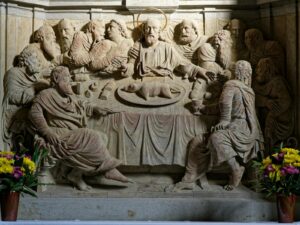Does the Bible Permit Exploitation? (Part 2)
The Old Testament is a complex tapestry of stories that often challenge our modern understanding of morality. In this episode of Almost Heretical, we dive into troubling narratives that seem to clash with today’s ethical standards—particularly around the treatment of women and the cultural norms of ancient Israel. How do we, as people who value the Bible, approach these stories when they seem to reflect values we’d reject today? Let’s explore this tension and what it means for our faith.
Wrestling with the Old Testament’s Ethical Challenges
The Old Testament is a complex tapestry of stories that often challenge our modern understanding of morality. In this episode of Almost Heretical, we dive into troubling narratives that seem to clash with today’s ethical standards—particularly around the treatment of women and the cultural norms of ancient Israel. How do we, as people who value the Bible, approach these stories when they seem to reflect values we’d reject today? Let’s explore this tension and what it means for our faith.
The Story of David and Bathsheba: A Deeper Look
Consider the well-known story of David and Bathsheba. David, often celebrated as a “man after God’s own heart,” takes Bathsheba, the wife of Uriah, into his household. The prophet Nathan confronts David, but the rebuke focuses on David’s greed and dishonor toward Uriah—not on Bathsheba’s experience. Nathan’s analogy compares Bathsheba to a lamb taken from a poor man by a rich one, framing the wrong as a violation of Uriah’s rights. This perspective reflects the patriarchal norms of the time, where women were often seen as part of a man’s property. The text also notes that David’s multiple wives were viewed as a blessing from God, a stark contrast to modern ideals of marriage. How do we reconcile this with our belief in a just and loving God?
Cultural Norms vs. Modern Ethics
The Old Testament often portrays women in ways that feel troubling today. In stories like Dinah’s, where a foreign man wrongs her, the focus is on the dishonor to her family—not her personal suffering. Similarly, in Genesis, Lot offers his daughters to protect his guests, prioritizing hospitality over their well-being. These narratives don’t explicitly endorse such actions, but they also don’t challenge the underlying cultural assumptions that devalue women. The laws in Deuteronomy further complicate this, often prioritizing male honor over female autonomy. For example, the tenth commandment lists a wife alongside a man’s house and animals as things not to covet, reflecting a worldview where women were seen as part of a man’s estate. These passages reveal a gap between ancient cultural norms and our contemporary values of equality and justice.
Grappling with the Bible’s Humanity
So, what do we do with these stories? One approach is to recognize the Bible as a human document, written by people wrestling with their understanding of God within their cultural context. These texts reflect the ethical standards of their time—standards that, as Tim points out, weren’t unique to Israel. Ancient Greek philosophers, often hailed as intellectual giants, also viewed women as lesser beings. The Bible isn’t worse than other ancient texts, but it’s not better than our modern ethical ideals either. Over the centuries, society has made strides toward equality, from the liberation of enslaved people to the push for women’s rights. These advancements challenge us to rethink how we relate to the Bible. Do we see it as an unchanging ethical anchor, or can we allow our understanding of justice to evolve?
A Path Forward: Honest Reflection
Nicole, a listener from Memphis, asked a poignant question: how does a Christian who believes in a just and loving God approach these Old Testament stories? For Nate, the answer lies in redefining what the Bible is. He no longer sees it as a divine rulebook dictated word-for-word by God, but as a record of people grappling with their faith and culture over time. This shift eased his struggle with the text’s inconsistencies—he doesn’t expect it to align perfectly with modern ethics. Tim agrees but admits the Bible’s failure to challenge certain norms still troubles him. He argues that by focusing on what these stories condemn (like dishonor to men), they implicitly accept other wrongs (like the subjugation of women). This realization pushes us to be honest about the Bible’s limitations.
What Does This Mean for Our Faith?
Rather than letting the Bible pull us back to outdated ethics, we can use our modern understanding of justice to guide how we engage with it. This might mean admitting that we disagree with some of its perspectives—like its treatment of women—and allowing our faith to grow through that tension. For some, this journey might lead to a faith crisis, or what’s often called deconstruction. Nate sees this as a powerful opportunity to rediscover faith, God, and spirituality in a new way. Tim echoes this, urging us to let ethical progress shape our theology, not hinder it. The Bible’s stories are part of our tradition, but they don’t have to define our values today.
Join the Conversation
This episode invites us to wrestle with hard questions. How do you approach these Old Testament stories in light of your faith? Have they ever challenged your understanding of God’s justice? Consider joining our Patreon community for bonus content where we dig even deeper into these topics. Thanks for journeying with us—we’ll see you next time.
More Episodes

Jeremiah Johnston: The Shroud Proves Resurrection
The Shroud of Turin Proves the Resurrection Could the most extraordinary claim in Christianity be backed by physical evidence? Dr. Jeremiah Johnston thinks so. In...

Why Didn’t Jesus Write Anything Down?
Why Didn’t Jesus Write Anything Down? Have you ever wondered why there is no Gospel of Jesus, penned by his own hand? For a figure...

6 Genesis Stories Read Politically
Genesis Wasn’t Written to Comfort—It Was Written to Explain What happens when we stop reading Genesis as a series of moral tales—and start reading it...
The Journey Continues
Almost Heretical has evolved into Faith Lab. Same heart, same tough questions, new name. Come join us.
VISIT FAITH LAB →